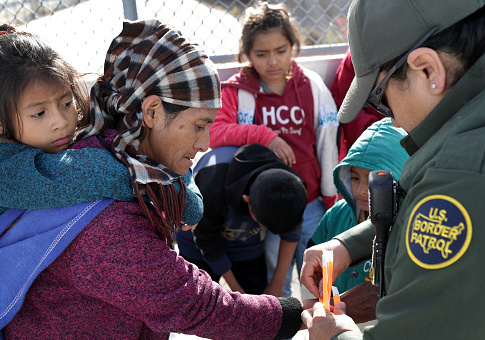U.S. Customs and Border Protection agents apprehended more than 70,000 people in February, the majority unaccompanied children or families, the agency announced Tuesday.
This figure is the highest monthly total at any point in at least the past five years, lending credence to President Donald Trump's ongoing claim that America is experiencing a "crisis" at its southwestern border.
"We are currently facing a humanitarian and national security crisis along our southwest border. The vast increases in families and children coming across our border, in larger groups and in more remote areas, presents a unique challenge to our operations and facilities, and those of our partners, including the NGOS who work to assist these individuals and families throughout their immigration proceedings," said CBP Commissioner Kevin K. McAleenan.
More than 36,000 "family units" (i.e., children and parent/guardians traveling together) were apprehended trying to cross the southwestern border between ports of entry; a further 4,000 were apprehended at points of entry. That total means that more family units attempted to cross the border illegally in February than at any point since the government began tracking the relevant data.
![]()
A further 6,000 unaccompanied minors were apprehended in February, the seventh highest total on record for USBP apprehensions. These young people will pose a unique problem for the Department of Homeland Security, which continues to litigate over the length of time it is permitted to detain apprehended children before releasing them into the interior.
Border patrol agents are also increasingly encountering "large groups" of more than 100 would-be crossers, CBP reported, counting 70 groups totaling more than 12,000 people in past five months alone. That size is substantial compared to FY 2018, when CBP saw 13 large groups; or 2017, when there were only two.
The upsurge in family unit apprehensions—which is driving the overall increase in apprehensions—reflects a shift in the composition of the would-be illegal immigrant population. Historically, most illegal immigrants have been single, Mexican adult men. But as Mexico's economy and demography change, the balance of the population shifts to families fleeing brutal violence in the "northern triangle" countries of El Salvador, Honduras, and Guatemala.
The increase also represents a startling inversion from just two years ago, when southwestern border apprehensions dropped precipitously, falling as low as 15,000 in April of 2017. Since then, the number of apprehensions has nearly quintupled, a reality the administration has taken exceptional action to grapple with.
For its part, CBP said Tuesday that it would erect a new Central Processing Center in El Paso, Texas, to cope with the influx of families and unaccompanied children; it also planned to expand medical services for children in detention.
"I am working with our government partners and have identified additional funding for humanitarian resources in the field, including expanded medical protocols, and the addition of a more appropriate central processing center to handle the increased volumes of family units and unaccompanied minors," Commissioner McAleenan said.
